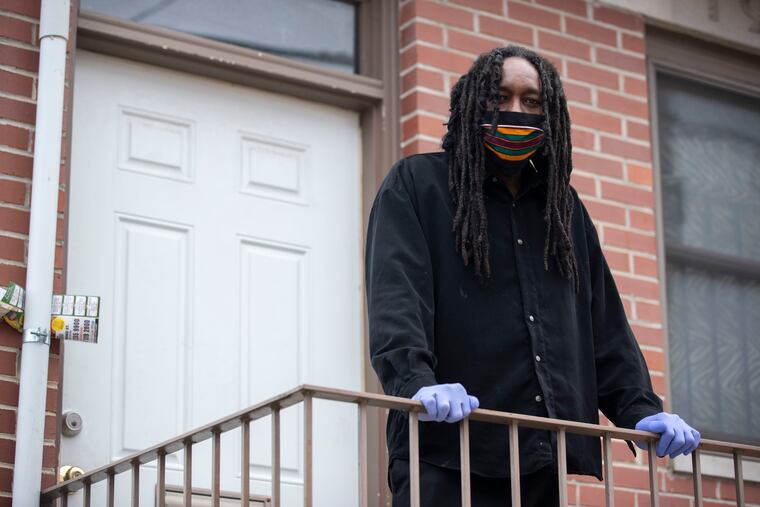‘This is real’: Local activist used Facebook to show nonbelievers his fight with COVID-19 | Helen Ubiñas
He wants to share his frightening battle in hopes of convincing people how real the virus is.

Jondhi Harrell spent nine days in the hospital after testing positive for coronavirus.
A lot happened in that time. His fever spiked, his chest throbbed from violent coughing fits, his mind — usually racing from one task to another — could focus only on his next breath, except for when his thoughts turned to his family.
This wasn’t some TV-news tragedy that happens to "other people."
This was his terrifying reality.
“Life-changing,” he said when we spoke.
But, as the well-known community activist drove away from Jefferson Hospital last week, he realized something hadn’t changed.
Either by choice or by circumstance, too many people in Philadelphia weren’t protecting themselves or one another against the virus, even as data show that the coronavirus is disproportionately affecting the poor.
Harrell, who shared his ordeal inside the hospital with live Facebook updates, turned the camera on himself as he drove to his North Philly home.
“I’m cruising down Allegheny Avenue, I just got off of 95 and I see so many little kids walking around with no mask and no gloves. It seems as though people think that everything is OK. Well, I can testify that it hasn’t been OK, because for the past nine days I’ve been fighting a serious battle and it wasn’t until the last couple of days that I finally got back to feeling like myself.”
Even before he started showing symptoms, Harrell was wearing a mask and gloves to protect himself and his family, including his 93-year-old father.
Harrell, who runs the Center for Returning Citizens, was working from his father’s home when he noticed one of his father’s health-care workers didn’t look well. Harrell’s daughter, a nurse, sent the worker home. While Harrell can’t be sure where he contracted the virus and his father has not shown symptoms, Harrell later learned that the caretaker tested positive.
By then, Harrell was lying in a hospital bed. Alone, he began to post updates of his condition for friends and family. But he was also sharing his frightening battle in hopes of showing nonbelievers that the virus was real.
With the historic losses of lives and jobs, it’s inconceivable to me that anyone still isn’t taking the coronavirus seriously. Even as I write this, I can see it outside my window: people walking around with no masks, standing and walking too close to each other.
It’s also beyond disturbing to watch willfully ignorant and armed protesters at anti-quarantine rallies who think they can bully a virus into submission, as if bullets can kill a virus.
It feels like one big repeat of 2016, except now it’s #fakenews and #fakevirus, with the biggest cheerleader of both sending dangerous tweets from the White House to “LIBERATE MINNESOTA! LIBERATE MICHIGAN! LIBERATE VIRGINIA, and save your great 2nd Amendment. It is under siege!”
All while the total number of cases worldwide has surpassed two million.
But there are other reasons for the disconnect, especially here in Philadelphia.
When people are living through visible epidemics of gun violence and drugs, it’s hard to believe how a mostly invisible virus could walk freely down the streets, board the bus, and take up residence.
When whole communities have felt diminished or ignored by the messengers of record, whether in newsrooms or government agencies, it’s easier to brush off their warnings — whether it’s about dangers to our democracy or our lives.
This isn’t just about a digital divide. It’s about inequality and invisibility.
Which might explain why some of the messages that seem to have the most resonance are the unfiltered ones from those on the front lines: the nurses and doctors and grocery clerks and bus drivers and, increasingly, the people fighting for their lives, like Harrell.
“I’m doing this so that people who are out there on the street, who are not wearing masks, who are not hand-sanitizing, who are not taking this serious, understand that this is real,” Harrell said in one of his posts. “I really was extremely careful. I wore a mask and gloves and followed the social distancing rules, but I still got it. Be careful with your life and the lives of those around you.”
Harrell is quarantining for 14 days as he monitors his recovery. The other day he gratefully accepted a friend’s offer to pick up some groceries for him. Then that friend told him he wasn’t wearing a mask. Harrell threw his hands in the air.
But he didn’t give up. He joined a Facebook group called “Coronavirus Warriors.” That afternoon, he was back on Facebook, sharing his story.